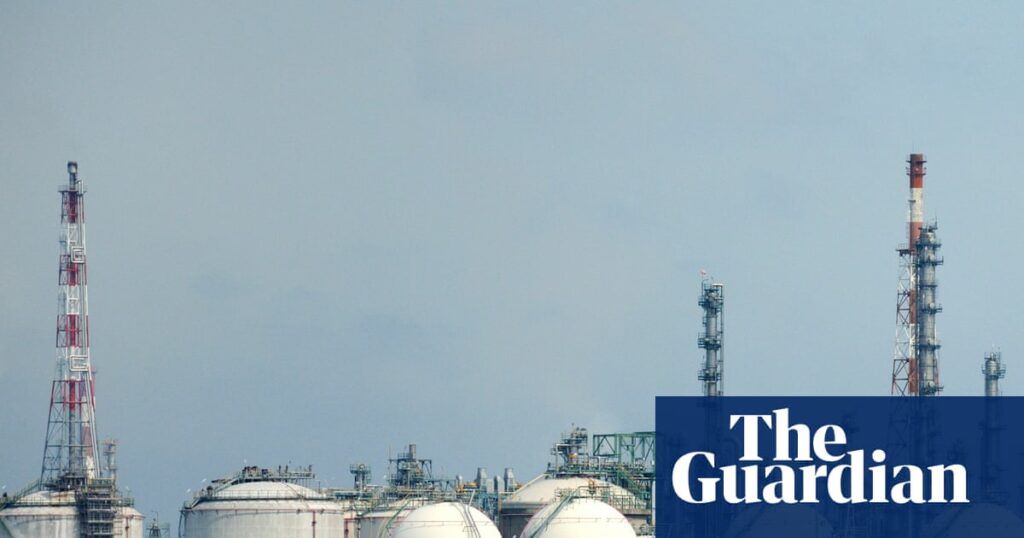Millions of tonnes of Russian oil have been traded through a port part-owned by Macquarie Bank and potentially sold on to Australian businesses, new data shows.
The identification of a new link between Australia and the trade in Russian-origin products exposes further gaps in government sanctions, as Australia lags behind the EU and the UK in tightening import rules.
Australia stopped buying fuel directly from Russia after its invasion of Ukraine but has imported more than 3m tonnes of Russian-originating oil products since 2023, the Europe-based Centre for Research on Energy and Clean Air (Crea) has found.
Australia’s sanctions allow purchases via third countries, which Crea’s Europe analyst Vaibhav Raghunandan said had indirectly supported Russia’s oil production and the Kremlin’s tax revenues.
“This is a significant loophole being exploited by Australian buyers who, while on the right side of the law, are undoubtedly on the wrong side of the ethics of it,” Raghunandan said.
Sign up: AU Breaking News email
“It clearly undermines Australia’s support for Ukraine. It not only allows the continued flow of Russian oil but also allows Australian companies to profit off it.”
Since January 2023, Australia has bought nearly a quarter of its refined petroleum imports from Singapore, government data shows.
The south-east Asian nation has received more than 22m tonnes of refined oil products from Russia over that period, according to analysis of Kpler trade data by Mark Corrigan, an Australian chemical engineer, and verified by Crea.
A third of those volumes went to the Jurong Port Universal Terminal, which is part-owned by a Macquarie investment fund.
A Macquarie spokesperson said the terminal was majority-owned by a Singapore government-owned entity and subject to applicable Singaporean and international regulations. A terminal spokesperson said it had robust processes to ensure due diligence and was fully compliant with applicable laws and sanctions.
Neither disclosed how Macquarie had financially benefited from its investment in the terminal or guaranteed the terminal had sold no Russian oil to Australia, when asked.
Kateryna Argyrou, chair of the Australian Federation of Ukrainian Organisations, called on Macquarie Bank to review its investment and disclose whether the terminal had facilitated the handling of Russian oil.
“Australia cannot stand with Ukraine while Australian capital helps sustain Russia’s war economy,” Argyrou said.
“Every drop of Russian oil sold helps finance the destruction of Ukrainian homes and lives. Australians deserve to know whether their banks and investment funds are profiting from that.”
The Singaporean government was contacted for comment.
Sales from Singapore
Companies with Australian operations have legally bought oil from Indian facilities with heavy Russian imports, government officials have previously confirmed. The same could be happening through Singapore, Corrigan’s analysis indicated.
after newsletter promotion
The terminal part-owned by Macquarie sold oil to companies including Trafigura, which in August received a $135m government bailout for its smelters in South Australia, and Vitol, the analysis showed.
The Shell petrol station operator and Australian defence force supplier, Viva Energy, buys oil from Vitol. Spokespeople for Vitol, Viva Energy and Trafigura each said their businesses acted in full compliance with all applicable laws and regulations, including sanctions.
They did not guarantee they had not bought or sold Russian-origin oil products to Australian businesses, consumers and government agencies, when asked.
Trafigura’s spokesperson said it did not trade with sanction-designated entities and Vitol’s spokesperson said it had rigorous policies and sought an open and transparent relationship with authorities wherever it operated.
The foreign minister, Penny Wong, has called on businesses to ensure their supply chains do not indirectly fund the Russian government.
“Australians do expect that their businesses ensure that their supply chains don’t inadvertently fund Russia’s illegal and immoral invasion of Ukraine. Businesses should uphold that responsibility and expectation,” Wong told Senate estimates in October.
She refused to commit to further restricting the trade, saying the government would struggle to trace indirect purchases. Australia was evaluating options to place further pressure on Russia’s oil revenues, a spokesperson for Australia’s Department of Foreign Affairs and Trade said.
The European Union and United Kingdom in October announced sanctions on third-party refiners of Russian material from 2026, including by targeting specific terminals and refineries.
Matching those sanctions would be essential to reduce oil revenue to the Kremlin, according to Dr Anton Moiseienko, a senior lecturer in law at the Australian National University.
“It’s really important to move towards that step,” he said.
“Otherwise [refineries] … keep purchasing Russian oil, and then refined products go to places like Australia, and all of that combines to create a market that generates billions for the Russian government.”

